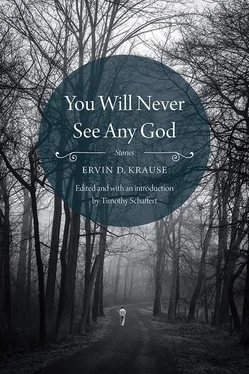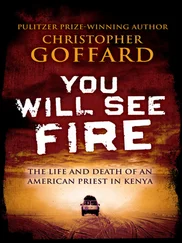“I don’t know,” the other said, quieter, his voice still high-pitched. “Don’t have to be crazy though,” he added doggedly.
“No, I don’t suppose so,” Leonard said. Thinking, what enormous pride we all have, accepting guilt for anything but our insanity.
He considered laying the gun on him then, saying he knew who he was, or better yet working it out of him, under threat of the rifle having him confess, yes that would be better. “All right you, the game is up. You murdered that family by Craig, didn’t you?” And he looked across that small distance, judging it expertly, thinking how easy it would be to shoot at that distance, separated by the gulf of the steep-banked creek, he looking now with clinical detachment at the sandy complexion, the round mouth sucking the cigarette, the slender wiry body, he considered it coldly, even as his left hand pulled at the itching biting cut on his neck, yes it would be easy, no need to even get a confession, no need to even approach the body after the shot, except perhaps to see where the bullet entered, it would be easy to nail this creature, simple, no more than a routine palliation, no worse than shooting that cat or the wren.
The other sat up straight, lifted his left hand to him. “Something the matter?” he asked. “What you looking like that for?”
“What?” Leonard said. The other was frightened, really frightened.
“I mean we’re just talking, having a cigarette. I’ll move the car, get out of here, if that’s what you want, sorry about coming in here. Should have got out right away, I guess. Dumb of me to sit here smoking a cigarette.”
How do I look, Leonard wondered, noted the point of the rifle had dropped, nosed in the direction of the other one, pointing at him, and he staring at the young man.
He tried a laugh. “Just thinking to myself,” he said. “Whenever I think about this cancer I get that way. Can’t help it.” He pulled the rifle erect again.
He had had a dream, repeated more than once, of himself in a foreign city (was it Leipzig, was it the terrible experience locked in the brain of a forebear of a century and a half before, passed on to him? five generations of nightmare) and there in late afternoon beside a stone church, the narrow streets cobbled to the church side, a figure leaned in a niche of the church (echoes of war around them), leaned there as if to make himself unseen, the figure in uniform, straggler, still the tatters of blue and red of the cloth, blood turned black on his wrapped head, with that measureless weariness on him, and the round eyes watching him. He (Leonard, whoever he was in the dream) came closer and the tired eyes of the beaten man fastened on him, watching him, and in his own hands (or in the hands of someone just in front of him that he was following, he could not be sure) was a club and he raised it and with a sudden thrusting powerful energy he struck at the head of the soldier, smashed the blood-ridden head, heard the dreadful sound like an axe dull on a soft stump.
A century and a half since Leipzig. Yes, he could do it, he could kill the young man, without pretense of compassion, confession, anything, just kill him, and told himself it was ridiculous, absurd, he who had never contemplated murder of anyone in thirty-odd years, and even as he thought it he studied the motion of the other stooping to fold the blanket, the fright of the other, this absurd fear of him, Leonard, that made him even more willing to do it, now contemplated a neat mark on the other to put his bull’s-eye on. He would feel nothing. Neither of them would feel anything.
At the same time he could have laughed. Was it possible? he asked, possible that a murderer of a whole family and hired man to boot would be frightened of him? No one had been afraid of him before, no need to be. And here the young man was obviously scared. It was amazing to him. He wanted to discuss it with the young man, but what could he say, how could he begin? “Say, are you afraid of me?” Pointing the rifle at him perhaps? As he might have asked the terrified cat a while before. The rifle made one invincible.
“Well, I got to be getting on,” the other said with his folded blanket under his arm, standing there facing Leonard as if asking permission to go to the car.
“Yes. Be sure and close the fence gate good and tight. These are young calves in here and pretty wild.”
“Sure will. I know all about fences.” The other went on then, to the car, got in. Leonard went the few feet so that he was opposite to him, so he could watch. The old car’s engine cranked over, finally started with a clatter, and the machine backed away. The young man stopped at the fence, carefully put up the wires, looking down through the trees to where Leonard stood, obscured he knew, watching. How easy it would be, the press, the snap of sound, the awful impact. He stood there, chilled, feeling the cold pressure of relentless and terrible things growing within him, feeling the stinging bite of his neck as if a snake had toothed him there.
The wires were painstakingly finished, the young man drove on, out of sight immediately but Leonard able to hear the retreat of sound.
All the way back to the farmhouse he shot anything that moved, two cottontails, a big brown thrasher, one crow, and a woodpecker. He did not miss.
Rudolph Schwier was the richest man in Charleston. He lived on the hill at the east end of town, up away from the river, in a shabby old frame house that had been white once but was turning gray. A house never made money for anybody, he always said. That’s what he told the wives of his farm tenants whenever they would timidly suggest wallpaper or calcimine for their chicken-coop houses. Old Schwier owned thirty-one farms, spread around Charleston in all directions, even across the river in South Dakota. He owned the creamery and one of the town’s two grain elevators, too.
Schwier had come to Charleston from Schleswig-Holstein when he was seventeen. He worked for a year as a hired hand for a bachelor, whose name no one remembered anymore, on a farm northeast of town until one day the bachelor got kicked in the head by a horse and was killed. Schwier brought him to town in a buckboard and they buried him. Schwier kept on farming out there and it wasn’t long before it was called the Schwier place. He was a hard-working man, no one could deny that; before he was twenty-five, he had two other quarter sections. Even then no one liked him much. The farmers around, who were far from gentle themselves, said he was a brute with his horses and cows, and besides that they could never talk to Schwier; he had nothing to say to them, and if they paused and leaned over the fence to await his coming to the end of the corn row at cultivating time, Schwier would simply turn his team and head back and not even look up at them.
When he was a little past thirty he married the fat daughter of one of his tenants. She turned into a stolid and heavy and silent woman and her arms were always burdened with kids. Schwier had four girls and six boys and when each was old enough, eight or so, they were working twelve and fourteen hours a day, just as he was. They went to school when Schwier found time to let them go, and they were all plodding and thick-witted and ham-fisted and they were supposed to be stupid. They got away one by one, hitchhiking out or catching the train or getting married and leaving if they could. If it was one of the boys who left, Schwier would go into an enormous rage. He got his buggy and a boy or two and the blacksnake whip and he drove around the countryside, asking all the farmers if they had seen his son. The only one he ever caught was the oldest; he found him under a wooden culvert and old Schwier pulled him out of there and tied a rope around the boy’s waist and dragged him home. He took the boy out into the barn and beat him half the night. The boy went around with a cringing look and with a crouched back and he shambled after that, but he tried again within six months. This time he was not caught.
Читать дальше











